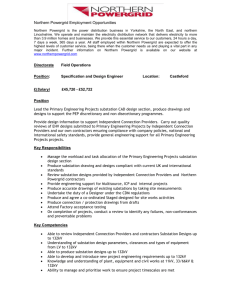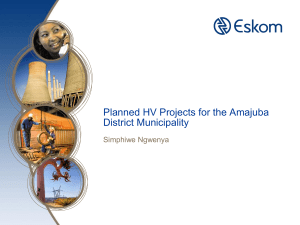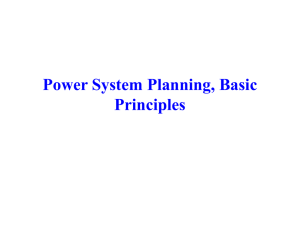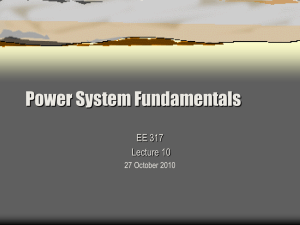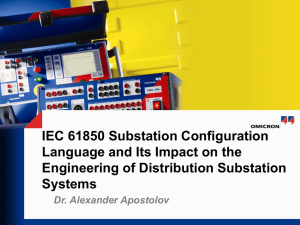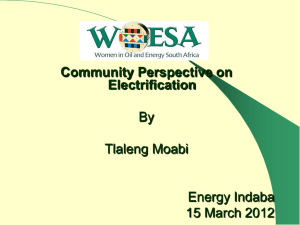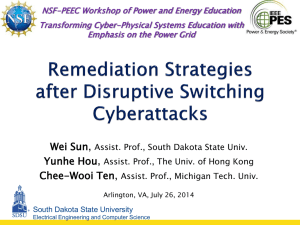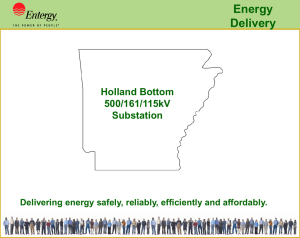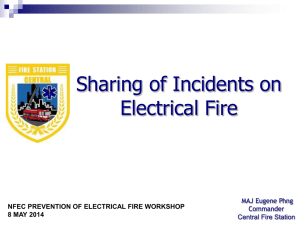Read more..
advertisement
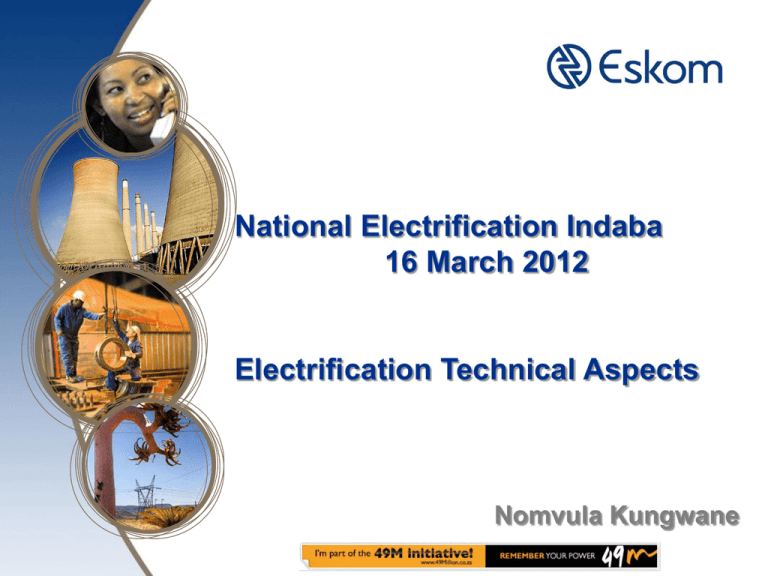
National Electrification Indaba 16 March 2012 Electrification Technical Aspects Nomvula Kungwane CONTENT Background Connections History Impact on Electrification Designs Backlogs, EC; KZN and Limpopo KZN; EC and Limpopo infrastructure Conclusion 2 BACKGROUND • Urban electrification was largely done in the past • un-electrified households in urban areas are mostly growth & informal settlements • Easy-to-execute projects were also done during the massive electrification program of the past • Reality now: • Difficulty to implement electrification projects without bulk infrastructure development • rural electrification with high costs • Funds are stretched to address both bulk infrastructure and household connections IMPACT • Less connections achievable • There is a continuous need for the integration of the Electrification programme with Eskom’s Capital programme across Eskom divisions, esp. Transmission and Distribution • example on planned infrastructure projects in the Eastern Cape, below DESIGNS • Changed from designing for initial ADMD to final ADMD designs and implementation • Cheap designs = high maintenance costs • Designs have evolved over the years, with mid-block (cheaper but difficult to reach for maintenance) and street-front • SWER & dual-phase networks have been changed for 3-phase networks to accommodate future growth • Split Metering technology implemented in some areas, to curb tempering • it is necessary to ensure that poles, conductor, and line hardware incorporated in existing designs are used optimally - spans should be maximized • Optimisation of designs for rural networks: installation of MV and LV conductors on the same poles/line BACKLOGS: EC; KZN & LIMPOPO PROVINCE TOTAL NUMBER OF HOUSEHOLDS BACKLOG (with growth) Backlog (%) EASTERN CAPE 1,683,420 647,593 19% KWAZULU NATAL 2,439,751 816,354 24% LIMPOPO 1,264,792 322,172 9% . . . . . . . . . . . . . . . . TOTAL NATIONAL 12,860,165 3,440,699 100% NATIONAL ELECTRIFICATION BACKLOG LIMPOPO 9% GAUTENG MPUMALANGA 7% NORTH WEST 6% NORTHEN CAPE 1% FREE STATE 6% KZN 24% WESTERN CAPE 6% EASTERN CAPE 19% KZN BACKLOGS OVERVIEW KZN NETWORK STATUS SUBSTATIONS REQUIRED Bulk Infrastructure Movement - Last 3 years • Completed Mandabeni; Nyokeni; Sgananda kaZokufa Shezi; Msinga; Hlabisa; Dlangezwa; Pomeroy • Under Construction Kenterton; uMzumbe; Ndwedwe; Mathondwane; Ladysmith; Corinth; Umzimkhulu • *Bulk Infrastructure Focus Areas Umkhanyakude; Ndumo; Gezisa, Mbazwana; Hlabisa; Gunjaneni; Ntambanana; Melmoth East; Mandini; ; Mangethe; uMshwathi; Applesbosch; uMzumbe; KwaXolo/KwaDeshula • *These substations are for the sole purposes of rural electrification, there are other Substations planned to be built by Eskom which will also assist in electrification Eastern Cape 13 EXISTING NETWORK Siphaqeni Qumbu Ugie Dumasi Sappi Kohlo 1st Falls Mafini Paynes Farm Qunu Tyalarha Wiloi Magwa PROJECTS FOR 2012/13/14 2nd 20MVA 132/22kV Qumbu S/S Trfr (RR) Qumbu Ugie 132kV line (30km) 2 x 20MVA 132/22kV Taweni s/s (DoE) 132kV line (30km) 2 x 20MVA 132/22kV Mfinizo s/s (DoE) Elliot/Ugie 132kV line (RR) 2 x 10MVA 132/22kV Mjika s/s 132kV link lines (4km) – (S) Sappi Mafini Sappi/Elliot 132kV line and 1 x 40MVA 132/66kV Elliot substation (S) Dumasi VUYANI MTS PROJECT Eros/Vuyani 400kV line, 3 x 250MVA 400/132kV Vuyani Substation (S) Kohlo Magwa 132kV line to Hombe S/S and 2 x 10MVA 132/22kV Hombe s/s (R) Paynes Farm Zimbane/Paynes 132kV line & 2 x 20MVA 132/22kV Paynes Farm S/S Paynes Farm/Sappi 132kV lines & 2 x 20MVA 132/22kV Sappi S/S (S) Qolweni/Hlobo and Hlobo/Vuyani 132kV line, 2 x 20MVA 132/22kV Hlobo S/S (S) Tyalarha Qunu Decomission old 66kV line and associated substations (R) 132kV link line (16km) 2 x 20MVA 132/22kV Tombo s/s (S) 132kV link line (2km) 2 x 20MVA 132/22kV Mafini s/s (S) 4 132kV feeder bay (S) Vuyani/Zimbane 1 132kV line; Vuyani/Zimbane 2 132kV line Vuyani/Mafini 132kV line; Vuyani/Qunu 132kV line Limpopo 16 LIMPOPO PROVINCE Network Status Red – Network constrained Yellow – Limited capacity on large parts of network 17 Green – Capacity Available Bulk Infrastructure Development Pontdrif Messina Leeudraai Venetia Thohoyandou New MTS Sanari Mandala RioTinto Coal NjeleleT Makhado Coal Makonde 2015/16 Paradise Thulamela Tshikeweta Soutpan Flurian Bochum Louis Trich Ribolwa Singo Dendron 2011/12 Botlokwa Tabor 2012/13 2015/16 Tshilamba Mbahe 2013/14 2011/12 Muledani 2013/14 Malamulele Venulu 2011/12 Mashau 2012/13 Hlanganani Mamaila 2011/12 Phugwane Giyani Thomo Bendstore Magpot Soekmekaar Spencer Mooketsi Polokwane Mhinga Bolubedu 2013/14 Tzaneen Mageva Mamitwa Witkop Tarentaal 18 Limpopo Bulk Infrastructure: 2010-2015 Item Project Name Municipality Scope 1 Singo Substation Makhado 2 Mashau substation Makhado 2 x 20MVA Substation 132/22kV 250M 132kV Line – Kingbird 3 (Jilongo ) Phugwane substation Lambani (Mhinga) Substation Thulamela 2 x 20MVA Substation 132/22kV 35kM 132kV Line – Kingbird Thulamela 2 x 20MVA Substation 132/22kV 30kM 132kV Line – Kingbird Mbahe Substation Thulamela 2 x 20MVA Substation 132/22kV 2kM 132kV Line – Kingbird 4 5 2 x 20MVA Substation 132/22kV 37kM 132kV Line – Kingbird Limpopo Bulk Infrastructure: 2010-2015 Item Project Name Municipality Scope 6 Tshilamba Substation Mutale 2 x 20MVA Substation 132/22kV 10kM 132kV Line – Kingbird 7 Mamaila Substation Greater Letaba 2 x 20MVA Substation 132/22kV 16kM 132kV Line – Kingbird 8 Mageva Substation Greater Letaba 2 x 20MVA Substation 132/22k 37kM 132kV Line – Chickadee 9 Mamatsekele Substation Lepelle Nkumpi 2 x 20MVA Substation 132/22kV 37kM 132kV Line – Kingbird Rampheri Substation Polokwane 10. 2x10MVA Substation 132/11kV 30kM 132kV Line – Kingbird CHALLENGES • Land acquisition for infrastructure projects • Significant footprint of Protected trees • Illegal connections • resulting in overloaded networks • Public fatalities (Bambamenchies; KaMhlushwa) • Maintaining good technical performance of the network – balance service extension with network strengthening; refurbishment as well as normalisation • Equipment theft: cables and transformers CONCLUSSION • Electrification requires focus from a financial and technical perspective in order to optimise costs and reach a bigger footprint • The industry must work together to implement available technologies for access to energy • Solutions for electrification should be custom made to avoid over and/or under-designs • Harmonisation between DoE & Human settlements • Eskom supplementary funding of infill connections and some infrastructure projects
